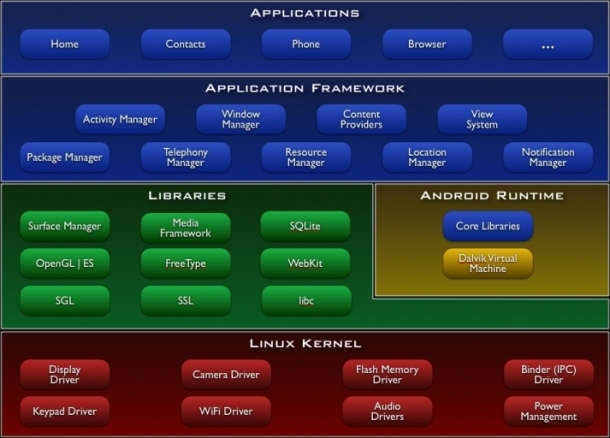Google accuses Oracle of bad faith in Android Java suit

Google has made a strong rebuttal to Oracle's lawsuit over the use of Java technology in the Android open-source mobile operating system, accusing Oracle of hypocrisy and claiming no patents have been infringed.
Oracle sued Google in August for patent and copyright infringement. The allegations related to the Android software stack's software development kit (SDK) and Dalvik virtual machine (VM), and the fact that Java-scripted apps can run in that virtual machine. Google struck back on Tuesday in a lengthy answer with counterclaims (PDF), filed in US district court in San Francisco.

Oracle and Google's dispute will likely centre on the Dalvik virtual machine (right side of chart), a key part of the Android mobile OS. Credit: Google
Google denied it had infringed on any of the patents mentioned by Oracle, which picked up the Java technology when it bought Sun Microsystems in January. Google claimed the relevant patents were invalid and unenforceable, adding that, due to their open-source nature, the Android ecosystem's use of the patents was non-infringing. The company also said Oracle was asking for too much in damages, and indeed demanded that Oracle pay Google's legal costs for the case.
In a detailed breakdown of the history of Java and Android, Google pointed out that when Sun was in charge of Java, Oracle had been one of the companies that criticised Sun for not fully open-sourcing the platform. Although Java was theoretically open, Sun refused to open-source the restricted-usage technology compatibility kit (TCK) that was necessary for demonstrating Java compatibility.
Asking that all of Oracle's claims be barred because they were made with "unclean hands" — a legal term that refers to unethical behaviour or acting in bad faith — Google noted that Oracle's reversed its stance on the need for Java to be completely opened up when it acquired Sun.
"[Once Oracle bought Sun], and directly contrary to Oracle Corp's public actions and statements, as well as its own proposals as an executive member of the [Java Community Process], Oracle Corp and Sun (now Oracle America) have ignored the open-source community's requests to fully open-source the Java platform," Google's lawyers wrote.
In addition, the company's lawyers filed a motion to dismiss or clarify Count VIII of Oracle's suit, which alleged that Android infringed on Java's copyright. "Google respectfully shows that the claim for copyright infringement asserted in Count VIII of the Complaint is legally deficient," the counterclaim reads.
"Count VIII does not identify any specific infringing work that is the subject of the alleged copyright infringement claim, does not identify with any specificity the manner in which Google allegedly infringed any copyrights of plaintiff [Oracle], and does not identify with any specificity the basis for any claim of vicarious infringement, inducement of infringement, or contributory infringement," it said.
The search giant added that Oracle's lack of specificity in its copyright infringement claim...
...was "both striking and telling", because Android is open source and its code is available for anyone to see.
Pamela Jones, author of the Groklaw intellectual property blog, wrote in a blog post on Tuesday that, unless Oracle "fills in the blanks", the judge could well dismiss that claim.
"The idea in the law is that you have to tell what your claim is, so the other side has a chance to defend itself," Jones wrote. "If you recall, SCO was sanctioned for not telling what it claimed IBM did wrong, so that later when it wanted to add materials, it was not allowed to. The magistrate judge said they were like a store detective grabbing someone leaving the store, claiming they stole something, but not saying what, instead handing the person a catalog and telling them: 'What you stole is in the catalog somewhere, so you find it. You know what you took'."
Jones also highlighted Google's assertion that it "does not receive any payment, fee, royalty or other remuneration for its contributions to the Android Platform", characterising that claim as "a detail that matters in any copyright infringement litigation".
Oracle responded to Google's filing by reiterating its central claims. "In developing Android, Google chose to use Java code without obtaining a licence. Additionally, it modified the technology so it is not compliant with Java's central design principle to 'write once and run anywhere'. Google's infringement and fragmentation of Java code not only damages Oracle, it clearly harms consumers, developers and device manufacturers," the company said in a statement sent to ZDNet UK's sister site CNET News.
The motion to dismiss Count VIII is scheduled for an 18 November hearing.
Oracle's Google suit is not the only Android-litigation that is currently in play. On Friday, Microsoft sued Motorola for patent infringement related to the use of Android in its handsets, and in March Apple sued HTC for patent infringement in its Android and Windows Mobile phones. HTC has since counter-sued Apple.